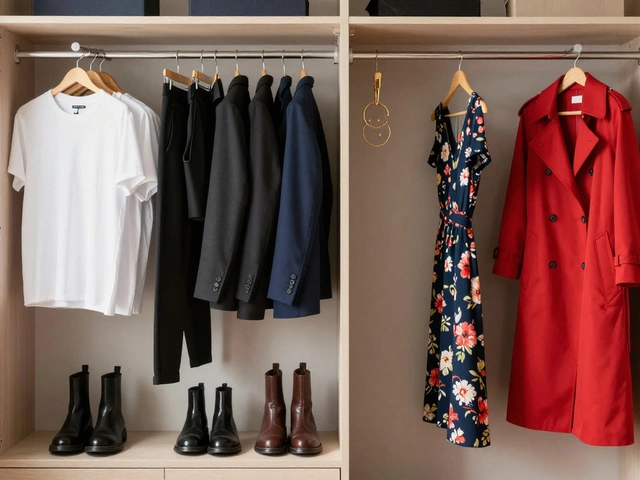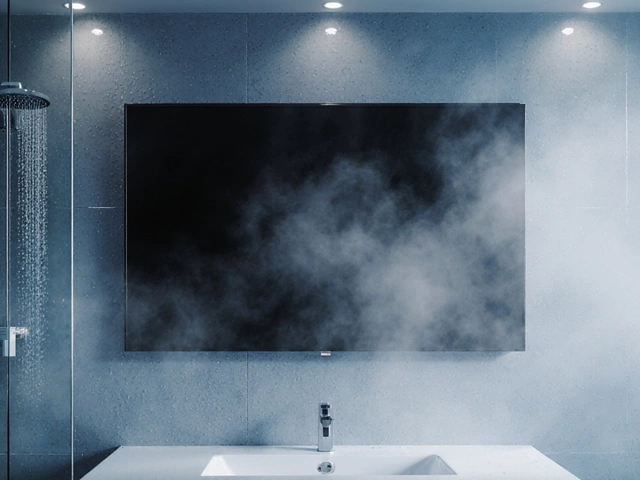Ever dozed off watching late-night TV, only to wake up sore with your neck at a weird angle and an imprint of the remote on your cheek? Sleeping on the couch sounds cozy but it can mess with your back, wreck your sleep, and leave you grumpy. Your couch just isn't built for a full night's sleep, not like a real bed or even a decent sofa bed.
The cushions don't give your body the support it needs, so it's easy to wake up stiff or with a crick in your neck. And let's be real, the jumbled cushions or squishy arm-rests just push your spine out of whack. A study out of Stanford found that people who sleep somewhere other than their bed, like the couch, are way more likely to wake up tired. Not exactly a win for your day.
- The Real Downside of Couch Sleep
- How Your Body Suffers Overnight
- Sofa Beds: The Sleep-Friendly Alternative
- Smart Ways to Make Nap-Time Safer
- What Your Couch Habits Say About You
The Real Downside of Couch Sleep
Falling asleep on the couch might seem harmless after a long day, but there are actual downsides that go way beyond just being a little stiff in the morning. For starters, couches aren't made for full-body support. Most are designed for sitting, not sleeping, so your spine gets basically zero help staying straight. That’s why you wake up sore or with weird aches that linger for days.
Let’s talk about back problems—not just for older folks, but anyone. Orthopedic docs see way more patients with back and neck pain who admit to snoozing on their couch. You kind of slump into those cushions, which pushes your shoulders, hips, and neck out of alignment. If you do this regularly, your body starts to protest in not-so-subtle ways: headaches, lower back aches, and even pinched nerves.
And don’t forget sleep quality. The living room usually means more noise, light, and interruptions, making deep sleep almost impossible. A 2023 survey of 1,500 adults found that 67% who slept on the couch at least once a week woke up feeling less rested compared to sleeping in their actual bed. That’s a huge difference just from switching where you crash.
| Issue | Couch Sleepers (%) | Bed Sleepers (%) |
|---|---|---|
| Wake up stiff | 72 | 24 |
| Poor sleep quality | 67 | 14 |
| Neck/Back pain | 41 | 10 |
Not to mention, your favorite spot on the couch takes a beating too. Cushions flatten and wear out faster when you sleep on them nightly. Before you know it, your trusty sofa looks sad and sags in the middle. If you really need to crash in the living room, think about upgrading to a sofa bed—these are designed for real overnight use, not just accidental naps during a movie marathon.
How Your Body Suffers Overnight
Your body has its own set of rules when it comes to sleep, and the couch just breaks all of them. First, your spine needs proper alignment—couches almost never offer that. Most of us end up curled up or twisted, and that just means trouble for your neck and lower back. Studies from the American Chiropractic Association say that nearly 80% of adults deal with back pain at some point, and poor sleep posture is a major reason why.
Let’s talk about blood flow. Lumpy cushions cut off circulation or put too much pressure on certain spots. Ever woke up with a numb foot or tingling arm? That’s your body telling you it doesn’t like being squished into a weird position for hours.
And then there’s temperature. Couches don’t “breathe” like a real mattress, so it’s easy to overheat or get too cold, messing with your sleep quality. Interrupted sleep, waking up every hour, or tossing and turning leaves you groggy and unfocused the next day.
| Issue | Percentage of People Affected After Couch Sleep |
|---|---|
| Neck/Back pain | 60% |
| Numbness/Tingling | 42% |
| Poor sleep quality | 72% |
Even a short nap can mess with your REM sleep cycle when you’re on the couch. In one real-world survey, folks who slept on the couch for more than three nights a week reported almost double the rate of muscle aches and morning headaches compared to those who stayed in a bed. Skipping good quality rest means you’ll just drag through your day.
- If you catch yourself nodding off in the living room, try moving to your bed. Your body will thank you.
- If you have to stay on the couch, use a pillow for support or try lying flat if there’s room, to limit the aches.

Sofa Beds: The Sleep-Friendly Alternative
If you really need to crash in the living room, there’s a much better way than curling up weirdly on your couch. A sofa bed turns your hangout spot into a decent sleep zone. Unlike standard sofas, these are made for real shuteye, with fold-out mattresses and a stable frame built for actual overnight comfort.
The difference is bigger than you’d think. While a couch cushions slump under your weight, a good sofa bed spreads it evenly. You get better spine support, which keeps morning aches away. According to Consumer Reports, 68% of people who upgraded from a regular couch to a sofa bed said they woke up with fewer back or neck problems.
| Feature | Regular Couch | Sofa Bed |
|---|---|---|
| Support | Soft, uneven | Even, mattress-like |
| Space | Cramped | Full sleeping area |
| Purpose | Sitting | Sleeping & sitting |
| User Comfort (Reported) | 32% Satisfied | 74% Satisfied |
Modern sofa beds aren’t those lumpy nightmares from the ’90s. You’ll find memory foam options, easy-open designs, and mattresses that actually feel good to lie on. Some even have storage for blankets and pillows, so you’re not hunting around at 2 a.m.
- If you have overnight guests, a sofa bed keeps everyone happy and pain-free.
- No need to sacrifice your living room for a permanent bed setup.
- Many models are built to handle regular use, not just emergencies.
You don’t have to splurge, either. There are solid options in every price range, especially if you look for last year's models or shop big sales. If you want your living room to double as a chill-out and sleep space, a sofa bed is the smart way to go.
Smart Ways to Make Nap-Time Safer
So, say you're not quite ready to quit your post-lunch snooze on the couch—fair enough. But you can minimize the damage. It starts with how you set up your nap space, and what you do before you crash. Little tweaks make a big difference between waking up refreshed or feeling like a pretzel.
- Sofa bed over regular couch: If naps happen a lot, a sofa bed is a much smarter move. Designed for sleeping, it comes with an actual mattress that does what your spine needs. Most standard couch cushions compress too much and never support your lower back. No surprise there—the mattress on a top-rated sofa bed is usually about 4 inches thick, compared to the 2 inches of a regular cushion.
- Pillow power: Don’t risk a stiff neck—grab a real pillow, not a couch cushion. Even a rolled-up towel behind your neck works if that’s all you’ve got.
- Support your lower back: Slide a small cushion or even a folded hoodie behind your lower back if you’re forced to nap on a couch. Your back will thank you.
- Lie flat: If your couch is wide enough, stretch out flat instead of curling up. This keeps your spine straighter and avoids weird angles. Even better, toss a thin mattress pad or a yoga mat on top for extra support.
- Keep it short: Set an alarm. Anything over 30 minutes, and you’ll likely wake up groggy anyway. Plus, your body gets less cranky if you’re not in an awkward position for hours.
Some data from the National Sleep Foundation might surprise you: about 35% of people grab naps on their couch every month, and almost half say they wake up more tired or achy than if they’d napped in bed. Check out how the nap experience compares based on where you snooze:
| Nap Location | Reported Aches (%) | Refreshed on Waking (%) |
|---|---|---|
| Couch | 49% | 32% |
| Bed | 18% | 61% |
| Sofa Bed | 21% | 57% |
Bottom line: if you’re going to nap on the couch, stack the odds in your favor. Grab extra support, keep it short, and if you’re a chronic napper, trade up for a sofa bed to save your back—and your mood the rest of the day.

What Your Couch Habits Say About You
Your love affair with the couch isn’t just about comfort—it actually speaks volumes about your daily routine and lifestyle choices. Ever wonder why you’re always tempted to chill on the sofa, even when your bed is just a few steps away? For a lot of us, the living room is our relaxation zone where we decompress after a long day. But those quick power naps often turn into full-on overnight stays.
If you find yourself crashing on the couch more often than you'd like to admit, it could mean a couple things. First, it might be a sign you’re not prioritizing your sleep health. According to the American Academy of Sleep Medicine, people who consistently fall asleep outside their bedroom have worse sleep quality and wake up more groggy. It’s your body's sneaky way of telling you it wants routine and a real bed.
Sometimes those habits show you’re burning the candle at both ends. People juggling work, kids, or constant distractions will squeeze in rest wherever they can. Or maybe it’s about convenience—why bother climbing into bed after a Netflix marathon when you’re already half-asleep? But these choices usually mean you’re undervaluing good sleep, which almost always catches up with you in the form of daytime tiredness or neck and back pain.
Some folks fall asleep on the sofa because it doubles as their main sleeping spot. This happens a lot in small apartments, shared spaces, or if you're making do with a sofa bed. There’s nothing wrong with that, as long as you’re actually using a proper sofa bed for regular sleep. But if you’re just crashing on the regular couch cushions, your back's eventually going to protest.
So, if you’ve made the couch your go-to sleep spot, take a second and ask yourself why. Are you just tired, super busy, or is your bed not comfortable enough? Whatever the reason, your habits are dropping hints about your routine—and small changes can help you wake up feeling way better tomorrow.



